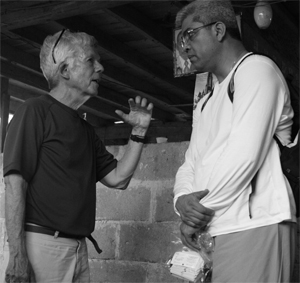Seeking the Edge of Your Comfort Zone
Final Thoughts
By Michael Weissberg, MD
 (October 2011) In a favorite cartoon, a man confesses to a friend, “I get a little tense before everything.”
(October 2011) In a favorite cartoon, a man confesses to a friend, “I get a little tense before everything.”
And I was tense as we landed, in the dark, at Quito’s often fog-bound airport. Quito, Ecuador, is long and narrow, the airport at 9,220 feet.
Squeezed by Andean Cordillera, the longest mountain range on earth, Quito also occupies the lower flanks of Pichincha Volcano, which last erupted in 1999.
Earthquakes are not infrequent here, either. But I wasn’t thinking about fog, earthquakes or volcanoes.
It was May 16, 2010, and I wondered what a psychiatrist was doing on a medical brigade. I was nervous because I didn’t know what to expect.
That first week passed quickly, my worry wasted. The experience was so interesting that by midweek I knew I would return, which I have, twice, to Quito and the Amazon basin. I have seen more than 600 patients.
It is always a never-boring, non-stop, well-run experience. After breakfast, we load buses, trucks
We then pack up, say goodbye and leave knowing a brigade will return in eight or 10 weeks.
But I also started to wonder if I enjoyed these trips too much. Shouldn’t volunteerism be selfless? Is altruistic pleasure an oxymoron? Does it matter? I return to Colorado energized and, I think, a better physician and teacher. But, exactly why is this experience so pleasurable and useful?
Of course, it isn’t one thing.
It is gratifying to work with appreciative patients and their panoply of problems—from diabetes, hypertension, abdominal pain, impetigo and scabies to fungal infections, parasites, URIs, UTIs and children low on growth charts. It is startling to see wounds that were the result of knee-high, tripwire shotgun traps or neuropathy from snakebites.
Learning is continuous, brigades real group practices, colleagues within earshot on the other side of a sheet or blanket, always available for consultation. And pharmacists, our Quito Eterno cultural guides, translators, brigade leaders, Ecuadorian nurses, community workers
But brigades are more than fun.
In Ecuador, we eat, sleep and work in foreign surroundings, operating at the edges of our comfort zone. Work is so out of the ordinary that it forces assessment of our assumptions, prejudices
We also meet patients in their villages, on their own turf—often with their families—not in the anonymous, culturally sterile offices of the U.S. In Ecuador, I can’t overlook the cultural differences that I might fail to see in the U.S. Ecuador is more satisfying and in some ways easier (if less HIPAA compliant). It is as if we do home visits with everyone we see.
So, what is a psychiatrist doing on a brigade? Believe me, last May, I wondered the same thing.
To prepare, I read, saw patients with other physicians and watched videos. I reminded myself that I completed a rotating internship (in the Bronx, speaking of culture), ran an emergency psychiatry service, have a psychiatric practice and am
So, for those of you who have not done something like this, give me a call or send me a note. A little tension can be a good thing.
Michael Weissberg, MD, is a professor and the executive vice-chair of the Department of Psychiatry and medical director at the Boulder Community Sleep Disorder Center. He can be reached at [email protected] or 303-724-7401.